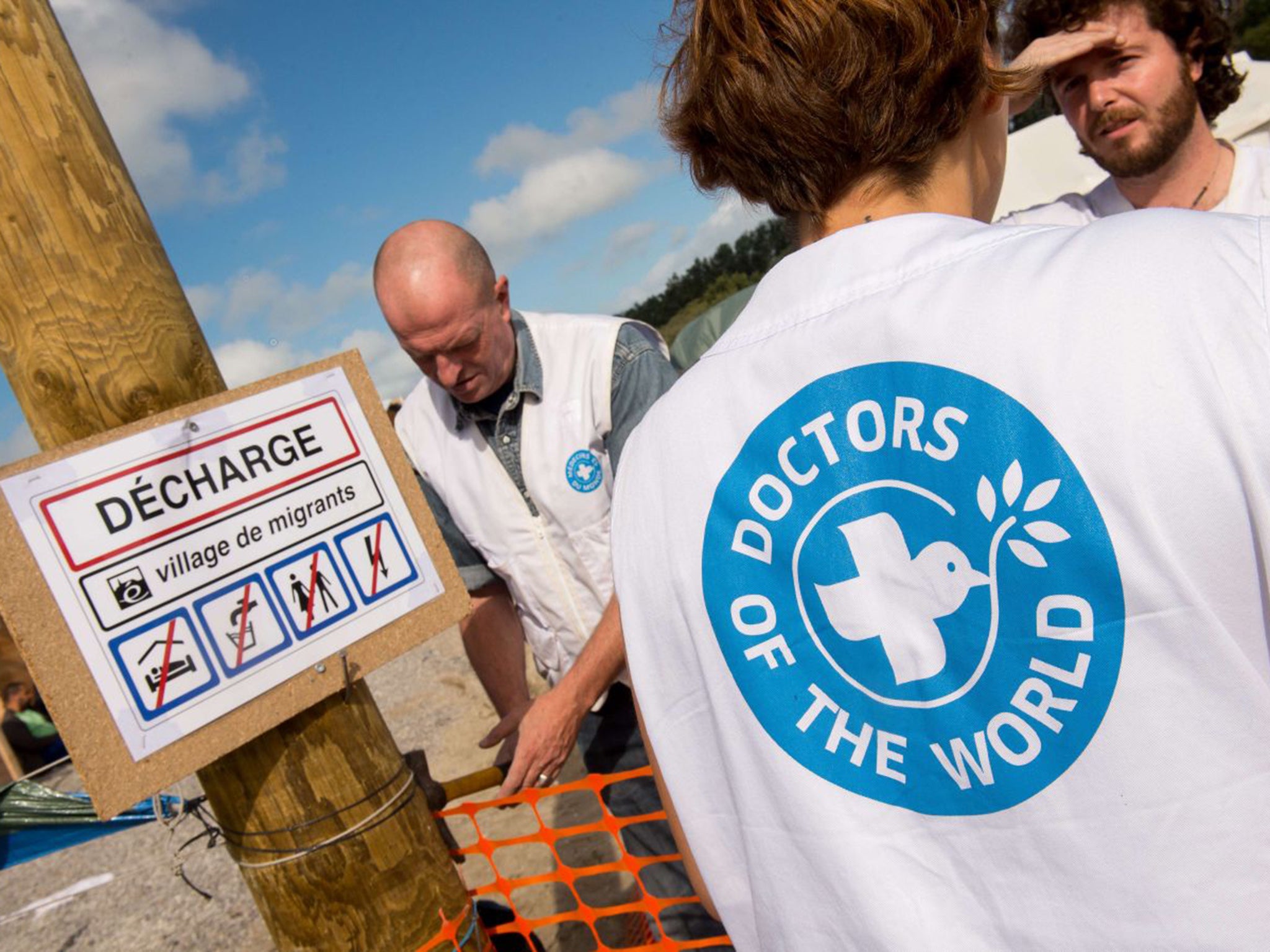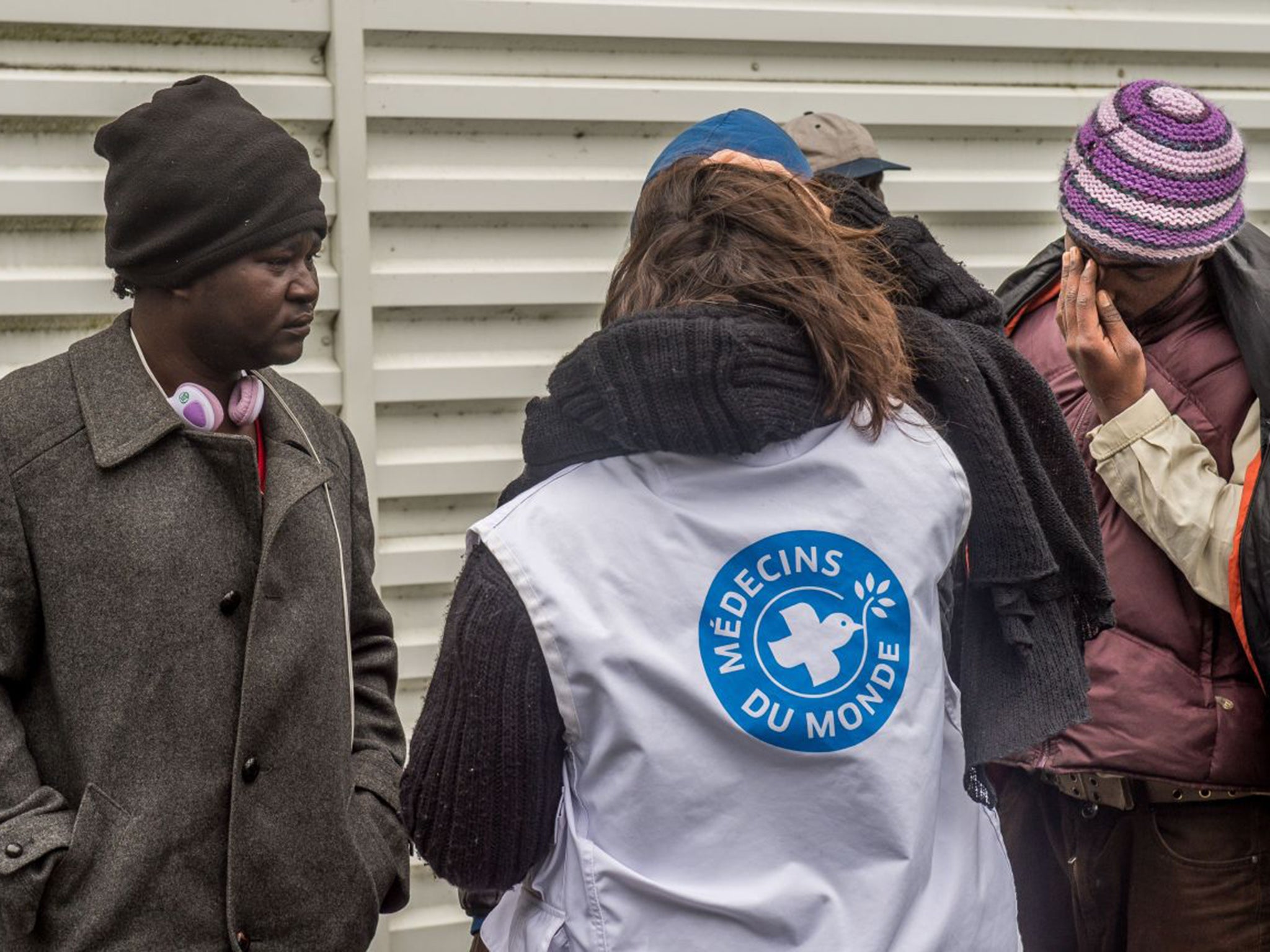Calais crisis: Migrants are living in appalling conditions, say doctors
Scabies is spreading like wildfire

Your support helps us to tell the story
From reproductive rights to climate change to Big Tech, The Independent is on the ground when the story is developing. Whether it's investigating the financials of Elon Musk's pro-Trump PAC or producing our latest documentary, 'The A Word', which shines a light on the American women fighting for reproductive rights, we know how important it is to parse out the facts from the messaging.
At such a critical moment in US history, we need reporters on the ground. Your donation allows us to keep sending journalists to speak to both sides of the story.
The Independent is trusted by Americans across the entire political spectrum. And unlike many other quality news outlets, we choose not to lock Americans out of our reporting and analysis with paywalls. We believe quality journalism should be available to everyone, paid for by those who can afford it.
Your support makes all the difference.In the sprawling shanty town among the sand dunes and motorways outside Calais, known locally as “the Jungle”, there is only one clinic, and its daily catalogue of health conditions tells a story about the kind of place this is.
“We see patients whose feet are in an awful condition,” says Holly Howe Watson, a nurse with Doctors of the World (DOTW), the only group providing medical care to the thousands of refugees and migrants who live here, in limbo. Some of the blisters, she says, are the kind that could form only on the feet of someone who has walked across France in flip-flops. Ms Howe Watson, 24, a newly qualified NHS nurse, is one of a small group of volunteers who staff the clinic.
Trauma injuries caused by attempts to climb towering security fences in order to board trains and lorries heading across the Channel are also common. As a queue forms outside the clinic over lunchtime on a sunny afternoon, one young man near the front sits with his head in bandaged hands.
“The barbed wire has lots of little spines and it really rips the skin,” says medic Dr Mohammed Bakir, 27, another volunteer. The staff have also seen dog bites, injuries from police batons, and broken limbs from jumping over fences.

“Scabies is also a huge problem,” Dr Bakir says. “I would estimate 30 to 40 per cent of my patients have it. It’s to do with the living conditions.”
Ramin, a 25-year-old teacher from near Kirkuk in Iraq, who arrived in Calais with three friends two months after fleeing fighting between Islamic State (IS) and the Kurdish Peshmerga – one of hundreds of thousands to have made the journey from the Middle East to Europe this year – says it is the first time he has seen doctors and nurses in weeks. He is grateful and enthusiastic about his prospects of reaching Britain.
Fadel, 33, a Sudanese teacher who has been in France for more than a month and has already run the gauntlet of security forces, fences and electrified train lines, is more doubtful: “For every sickness, all they can give is the same antibiotics,” he says. “There are maybe 3,000 people here. How can they cope?”
In a place where four, five or more people share a small tent, where access to water is limited and hot water almost non-existent, where rubbish piles up or is burnt by the roadside, scabies – which causes intense itching and can be passed on via bedding and clothing – will spread like wildfire.
You can get the mites out of your clothes by putting them in boiling water, or sealing them in a bag for two weeks, Dr Bakir says. “But if anyone here did that they probably wouldn’t have clothes for two weeks.”
Living conditions in the Jungle are perfect for any infectious condition to spread. Exhausted people are more susceptible, and colds and flu are very common. There have even been cases of chickenpox among the camp’s many Sudanese residents, who are rarely exposed to the infection back home, and now, in adulthood, get a more severe form of the common childhood disease.
The United Nations special representative on international migration, Peter Sutherland, has called conditions in the Calais camp as “an indictment on society” and that he would not easily recover from the “shock” of what he had seen in Calais. On Friday, he said that a politician would have to be “totally insensate to see the Calais camp and not to be moved by it”.
A limited supply of medicines is prescribed and people can be patched up. The seriously hurt are taken by DOTW staff to the local hospital, which cannot turn down urgent cases, whatever a person’s immigration status.
Concern about the dire conditions in the Jungle have now prompted calls for action from the UK’s leading medical union, the British Medical Association (BMA). Dr John Chisholm, chair of the BMA’s medical ethics committee, last week called for urgent action from government on both sides of the Channel.
“Many of those fleeing armed conflicts, including the current conflict in Syria, fear for their lives. All face the loss of their home, their livelihood and their community. Their plight is truly appalling,” Dr Chisholm said. “The arrangements for refugees and asylum-seekers in Calais are grossly unsatisfactory, and the UK and French governments need urgently to improve the environment and the care of the displaced persons who are living in such parlous conditions.”
Leigh Daynes, DOTW’s UK director, said that the charity is reaching the limits of what it can do. “People are living in horrendous conditions,” he said. “We are calling for a proportion of the funding allocated to Calais to improve security at the port to be diverted towards meeting the serious and immediate humanitarian needs of migrants.
“Calais is neither a French nor a British problem. It is a global issue which needs a global response.”
Join our commenting forum
Join thought-provoking conversations, follow other Independent readers and see their replies
Comments